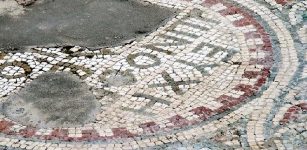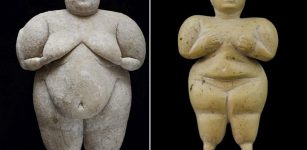Ostracism: Political Practice In Ancient Athens
Conny Waters - AncientPages.com - Ostracism in ancient Greece was a political procedure that resulted in a temporary banishment from a city by a popular vote. Under the Athenian democracy, a citizen who threatened the stability of the state could be banished from the city for ten years. Each year the Athenians were asked in the assembly whether they wished to hold ostracism.
Any citizen entitled to vote in the assembly could write another citizen’s name down, and, when a sufficiently large number wrote the same name, the ostracized man had to leave the city within 10 days.
The School of Athens by Raffaello Sanzio da Urbino. Credit: Public Domain
In Exile, Ostracism and the Athenian Democracy, Forsdyke Sara writes that "the institution of ostracism has long puzzled historians. Why did the Athenians invent a procedure for exiling citizens by democratic vote in the late sixth or early fifth centuries? How are we to explain the peculiarities of the institution, the fact that there were no speeches of accusation, for instance, or that potential victims were not permitted to defend themselves? Why was the term of exile limited to ten years, after which the victim could return with his property and reputation intact?”
See also:
Ancient Greeks Invented Alarm Clocks
Ancient Greek Myth Reveals The Olympic Games Were Founded By A Cheater
What Was The Role Of The Priests And Priestesses In Ancient Greece?
Forsdyke's theory is that “the problem of exile played a central role in the democratization of Athens.” Forsdyke argues that “the development of democracy was not a conscious process towards a more egalitarian political system but, in part, the result of periods of crisis, crises of exile. In these crises, non-aristocrats were compelled to involve themselves in the political struggles of aristocrats and thus bring stability to the polis.
In doing so, they assumed both power over decisions of exile and political power. The fundamental role of exile in the development of Athenian democracy helps to explain the symbolic importance of ostracism as an expression of popular power.”
Ostracism is said by Aristotle, in his Constitution of Athens, to have been introduced by Cleisthenes in his reform of the Athenian constitution after the expulsion of Hippias (c. 508 bc), but the first use of it seems to have been made in 488–487 B.C. , when Hipparchus, son of Charmus of Collytus, was ostracized.
Written by Conny Waters – AncientPages.com Staff Writer
Copyright © AncientPages.com All rights reserved. This material may not be published, broadcast, rewritten or redistributed in whole or part without the express written permission of AncientPages.com
Expand for referencesForsdyke, Sara. "Exile, Ostracism and the Athenian Democracy." Classical Antiquity 19, no. 2 (2000): 232-63. doi:10.2307/25011121.
More From Ancient Pages
-
 What Can The 3D Reconstruction Of The Principia At Novae Reveal About Roman Propaganda?
News | Sep 16, 2023
What Can The 3D Reconstruction Of The Principia At Novae Reveal About Roman Propaganda?
News | Sep 16, 2023 -
 4 Things Ancient Greeks And Romans Got Right About Mental Health
Featured Stories | Aug 30, 2024
4 Things Ancient Greeks And Romans Got Right About Mental Health
Featured Stories | Aug 30, 2024 -
 New Project Aims To Solve Mysterious Millennia-Old Rock Carvings Of Argyll, Scotland
Archaeology | Mar 20, 2017
New Project Aims To Solve Mysterious Millennia-Old Rock Carvings Of Argyll, Scotland
Archaeology | Mar 20, 2017 -
 Mystery Of Ancient Sarcophagi In Egypt
Ancient Mysteries | Aug 26, 2015
Mystery Of Ancient Sarcophagi In Egypt
Ancient Mysteries | Aug 26, 2015 -
 Viking Fashion: Men And Women Were Vain And Very Clean During The Viking Age
Ancient History Facts | May 17, 2024
Viking Fashion: Men And Women Were Vain And Very Clean During The Viking Age
Ancient History Facts | May 17, 2024 -
 LIDAR Discovers 18-Kilometer (11-Mile) Maya Road In The Yucatan Jungle
Archaeology | Dec 5, 2023
LIDAR Discovers 18-Kilometer (11-Mile) Maya Road In The Yucatan Jungle
Archaeology | Dec 5, 2023 -
 Hiidenkirnut: Spectacular Millennia-Old Devil’s Churns In Finland
Featured Stories | Jan 16, 2017
Hiidenkirnut: Spectacular Millennia-Old Devil’s Churns In Finland
Featured Stories | Jan 16, 2017 -
 Legendary And Mysterious Stone Of Brutus – The London Stone Refuses To Give Up Its Secrets
Artifacts | Jan 21, 2022
Legendary And Mysterious Stone Of Brutus – The London Stone Refuses To Give Up Its Secrets
Artifacts | Jan 21, 2022 -
 Researchers Find Oldest Evidence Of Human-Caused Lead Contamination In Aegean Region
Archaeology | Feb 4, 2025
Researchers Find Oldest Evidence Of Human-Caused Lead Contamination In Aegean Region
Archaeology | Feb 4, 2025 -
 Mosaics With Oceanus And Medusa In Tomb Of Ancient City Of Perge, Turkey
Archaeology | May 16, 2017
Mosaics With Oceanus And Medusa In Tomb Of Ancient City Of Perge, Turkey
Archaeology | May 16, 2017 -
 Amergin: First Druid And ‘Wondrously Born’ Son Of Mil, Founder Of Poetry, Was Judge In Irish Mythology
Celtic Mythology | Mar 3, 2022
Amergin: First Druid And ‘Wondrously Born’ Son Of Mil, Founder Of Poetry, Was Judge In Irish Mythology
Celtic Mythology | Mar 3, 2022 -
 Neolithic People Ate Focaccia As Far Back As 9,000 Years Ago
Human Beginnings | Nov 25, 2024
Neolithic People Ate Focaccia As Far Back As 9,000 Years Ago
Human Beginnings | Nov 25, 2024 -
 Mysterious Megalithic Stones Of Carnac, France – An Unsolved Neolithic Enigma
Civilizations | Oct 12, 2018
Mysterious Megalithic Stones Of Carnac, France – An Unsolved Neolithic Enigma
Civilizations | Oct 12, 2018 -
 Erik The Red: Famous Viking Outlaw Who Colonized Greenland And Was Father Of Leif Erikson
Featured Stories | Jun 16, 2020
Erik The Red: Famous Viking Outlaw Who Colonized Greenland And Was Father Of Leif Erikson
Featured Stories | Jun 16, 2020 -
 First Scandinavian farmers were far more advanced than previously thought
News | Aug 23, 2015
First Scandinavian farmers were far more advanced than previously thought
News | Aug 23, 2015 -
 Abydos: One Of The Most Important Cities Of Ancient Egypt
Featured Stories | Jul 15, 2016
Abydos: One Of The Most Important Cities Of Ancient Egypt
Featured Stories | Jul 15, 2016 -
 Figurines Unearthed At 9,000-Year-Old Çatalhöyük Site Symbolize Elderly Women, Not Goddess Cybele
Archaeology | Mar 1, 2017
Figurines Unearthed At 9,000-Year-Old Çatalhöyük Site Symbolize Elderly Women, Not Goddess Cybele
Archaeology | Mar 1, 2017 -
 Bronze Age Vatya Culture: ‘Urnfield’ Cemetery And Remains Of A High-Status Woman
Archaeology | Jul 30, 2021
Bronze Age Vatya Culture: ‘Urnfield’ Cemetery And Remains Of A High-Status Woman
Archaeology | Jul 30, 2021 -
 Silphium – Remarkable Ancient Herb That Mysteriously Vanished
Ancient Traditions And Customs | Jul 10, 2021
Silphium – Remarkable Ancient Herb That Mysteriously Vanished
Ancient Traditions And Customs | Jul 10, 2021 -
 Did Ancient Romans And Greeks Love As We Do? Perhaps Even More Hopelessly
Featured Stories | Jul 30, 2024
Did Ancient Romans And Greeks Love As We Do? Perhaps Even More Hopelessly
Featured Stories | Jul 30, 2024

